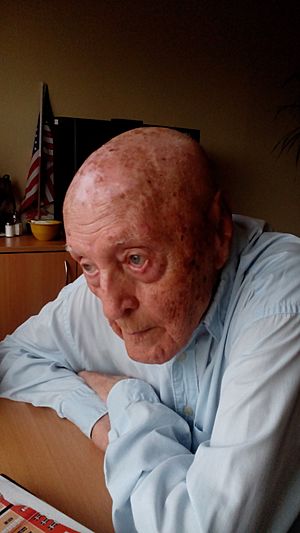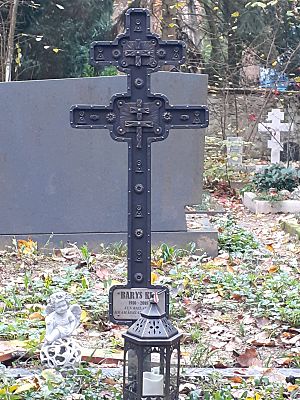Barys Kit facts for kids
Quick facts for kids
Boris Kit
|
|
|---|---|

Kit in 2015
|
|
| Born |
Boris Uladzimiravich Kit
April 6, 1910 |
| Died | February 1, 2018 (aged 107) |
| Alma mater | Vilnius University University of Regensberg |
| Known for | "Rocket Propellant Handbook", space research |
| Scientific career | |
| Fields | Mathematics, Astronautics, Chemistry, Physics. |
Boris Uladzimiravich Kit (Belarusian: Бары́с Уладзіміравіч Кіт, Russian: Бори́с Влади́мирович Кит; April 6, 1910 – February 1, 2018) was an amazing Belarusian-American scientist. He was a rocket expert who helped with space travel!
Contents
Who Was Boris Kit?
Early Life and Education
Boris Kit was born on April 6, 1910, in Saint Petersburg, which was part of the Russian Empire at the time. His family was from Belarus. In 1918, his family moved back to their home village, which is now the town of Karelichy. This area later became part of Poland in 1921.
After finishing school at the Navahrudak Belarusian Lyceum in 1928, Boris went to Vilnius University. He studied physics and mathematics. After graduating in 1933, he became a teacher. He taught at the Belarusian Gymnasium of Vilnia in Vilnius. By 1939, he became the principal of that school.
Life During World War II
When World War II started, Boris Kit returned to his home region. He became the principal of the Navahrudak Belarusian High School. He also helped manage many schools in the area. Thanks to his efforts, hundreds of new schools opened in just one year!
During the war, Boris worked as a teacher and later as a director of a teachers college. He faced danger during this time. He was arrested by German forces, but his former students helped save him from harm.
Moving to America
In 1944, Boris Kit and his family moved to Germany as the war continued. Later, in 1948, he moved to the United States. He settled in Los Angeles in 1950. There, he worked as a chemist for different companies.
Boris Kit's Work in Space
Helping with Space Research
In the mid-1950s, Boris Kit started working in the exciting field of astronautics. This is the science of space travel! For 25 years, he was part of America's space research program.
He used his skills in mathematics and systems analysis. He helped create missile systems. Boris Kit was involved in many important American space research projects. This included developing the math needed for the mission to the Moon!
Later Years and Legacy
In 1972, Boris Kit moved to Frankfurt am Main in Germany. He decided to continue his career in Europe. He taught mathematics at the European College of the University of Maryland. He also worked on a special project about a mathematician named Antoni Zygmund.

Even though he lived in different countries, Boris Kit always remembered his Belarusian roots. He once said, "Everything I did in my life — I did for my homeland and its fame." He lived a very long life, celebrating his 107th birthday in 2017. He passed away on February 1, 2018.
His Scientific Achievements
Rocket Propellant Handbook
Boris Kit wrote a very important book called "Rocket Propellant Handbook." It was the first guide about rocket fuel! The book was published in 1960 and is still used and referenced by rocket scientists today. It received many good reviews.
In 1982, Boris Kit earned his Ph.D. (a high academic degree) from the University of Regensburg. He studied mathematics and the history of science.
Awards and Memberships
Boris Kit was a respected member of many important groups:
- He was a long-time member of the American Institute of Aeronautics and Astronautics. This group focuses on space and flight.
- He was an honorary member of the Hermann Oberth German Astronautics Society.
- He was a member of the International Astronautics Academy in Paris.
- He was Vice-President of the Eurasian International Astronautics Academy.
- He was a Professor Emeritus (a retired professor who keeps their title) at Maryland University.
- He received an Honorary Doctorate of Science from Hrodna State University.
- He was an honorable resident of Navahrudak, his home region.

